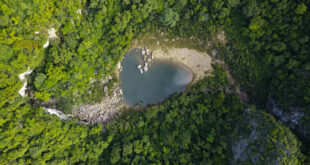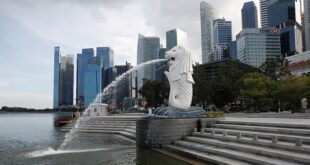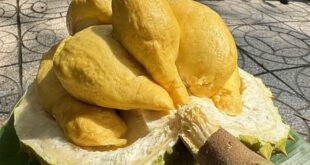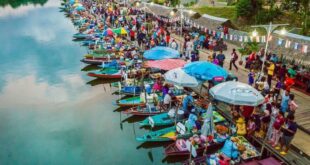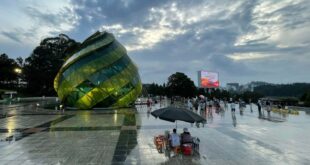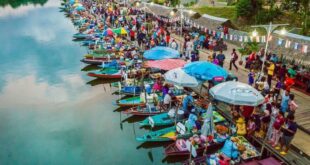A common point among some of the popular tourism destinations I have been to is that the people there are friendly and enthusiastic and offer proper services.
Earlier this year I went on my first trip to France. It was late at night when the plane landed in the capital. The first thing I saw was a huge sign saying, “Paris vous aime” (Paris loves you).
Throughout the Charles de Gaulle airport were countless such welcoming signs.
I traveled with my daughter and we were the only Vietnamese on that flight.
When it was our turn to go through immigration, the French customs officer, a young man, smiled, glanced at my passport and said “Xin chao, ban co khoe khong?” meaning “Hello, how are you?” in Vietnamese.
We were surprised and uncertain for a moment if the French officer had just greeted us in Vietnamese.
He didn’t ask any more questions or for any more documents. He quickly stamped the papers to let us go.
How much ever our fatigue from the long flight, it disappeared in a flash at this Vietnamese greeting in France and made us feel happy and welcome.
Another time in Osaka, Japan, a customs officer in her 40s glanced my passport quickly, stamped it, returned it to me with both hands, and clearly explained the information on the seal.
Then she stood up and bowed to me before sitting again to continue working. I was extremely surprised at being greeted with such politeness.
Then I went to an information desk to ask for directions and a map.
The employee there also bowed, quickly asked me what I needed, and then gave not only a map but also several guide books and leaflets, three packs of tissues and two small tubes of facial cleansers, all free of charge for tourists.
When I went to South Korea, I was even more surprised by how professionally people there marketed their tourism.
As soon as we arrived in Seoul, at the information counter of the main metro station, I was trying to find some English travel documents when suddenly my companion saw a map and thick travel guidebook in Vietnamese along with versions in many other languages, all for free.
Visitors from various places can confidently travel around Korea because they have all the information they need in their mother tongue.
The use of many languages is so common in Korea that some stores even put up a sign outside saying “Today we serve in English, Japanese, Chinese, Thai, Vietnamese…” It means they hire staff fluent in those languages to greet guests who cannot speak Korean.
In other countries we learned more “secrets” about how to attract and retain visitors.
When we arrived in Myanmar’s ancient capital of Bagan, it was midnight. At the entrance to this world famous archaeological site was a ticket booth where visitors only had to pay around US$15 for three days of comfortable travel.
Bagan is large and magnificent, and few tourists stay for only one day, and so the three-day ticket is quite reasonable and reduces the hassle of having to buy a ticket every time for visitors. Now they also issue electronic tickets and so a lot of paperwork is reduced.
One great thing we discovered during our few days in Bagan was that there were no taxis or petrol motorbikes. The tranquil old city was quiet, fresh and pleasant without the noise of engine and dust.
Visitors could walk, but most of them rented bicycles or electric scooters for a couple dollars a day. The few days in Bagan were serene and as if we were lost in another world, away from the hustle and bustle of everyday life.
Surely the city knew the needs of tourists, because you could find a clay pot containing water every 200 m. All were placed under trees and on clean high shelves with two or three aluminium cups attached to them. There were few people, but every pot was always full of cool, clear water for tourists.
When I went to Thailand for the first time, I was surprised to see at the airport a long table with some typical local fruits for visitors to try.
At the airport were free maps and travel books in various languages, lots of separate counters for short tours, long tours, art shows, currency exchange, cafes and restaurants, etc.
During all these trips, we almost never encountered crimes like fraud, overpriced services, or robbery. We enjoyed a lot of free services, especially basic ones like toilets and drinking water.
Of course, every time I traveled back to Hanoi from abroad, a sense of love and familiarity would well up. But it would often dissipate quickly when I reached immigration.
Most of the time I see an empty Noi Bai Airport. There are almost no shops in the international terminal. I have searched for years but not found an information counter providing maps or guidebooks, selling tours or providing other services.
It was not until June this year that I saw a “Welcome” sign there for the first time in my life along with a small fake peach blossom tree.
The only mode of public transport to the city from the airport is bus, and it only works for those who are familiar with the bus stops. There are no electronic boards on the bus, and there are no information in any other language except Vietnamese. Visitors cannot buy a day pass or day tour, for long popular in other countries. There are also very few places that sell tickets online.
Clean public toilets and free drinking water are not easy for visitors to find either.
The world has been ahead of Vietnam for many years, especially in tourism, and we should see that as an advantage and learn from them, even the smallest of things.
No solution will work for the tourism industry if visitors do not feel they are welcomed to or cared for in Vietnam.
- Reduce Hair Loss with PURA D’OR Gold Label Shampoo
- Castor Oil Has Made a “Huge” Difference With Hair and Brow Growth
- Excessive hair loss in men: Signs of illness that cannot be subjective
- Dịch Vụ SEO Website ở Los Angeles, CA: đưa trang web doanh nghiệp bạn lên top Google
- Nails Salon Sierra Madre
 VnExpress News The News Gateway of Vietnam
VnExpress News The News Gateway of Vietnam
